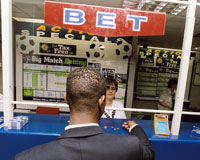Ed Miliband’s election pledge to allow councils to block bookmakers and payday loan shops would have little impact on the high street.
Figures from the Local Data Company show that betting shops, cheque cashing shops and pawnbrokers make up just over 2% of the country’s shops. In the worst-affected region, the North East, they represent 3.17% of total stock (see below).
The Labour party leader said this week that he would give councils the power to oppose shops such as bookmakers, takeaways and payday loan shops to preserve high streets’ character.
He said a Labour government would create a new business class enabling councils to place some properties in a different planning category so the “wrong” sort of shops could be prevented from proliferating.
Under current legislation betting shops are classed as financial services and may open in old bank units without applying for a change of use.
However, figures from EGi show that even when given a choice, councils cleared over 80% of applications by betting shop last year, turning down just 25 out of 139.
“There is clearly an existing appetite to convert A1 space into betting shops, so a new use class would only prevent, or perhaps merely delay, betting shops occupying units formerly occupied by businesses which also fall under the A2 category,” said EGi head of retail Graham Shone.
“It’s not unreasonable to see the new use-class as nothing more than red tape.”
The proliferation of betting shops and payday loans shops have come under scrutiny both from the Labour party and Mary Portas as the downturn has continued to hit high streets. However, the number of betting shops submitting a planning application has dropped from 56 in the first quarter of 2007 to 47 in quarter one this year, according to EGi data.
Click on the interactive graph below to see the breakdown by region of the different shops.
DATA EMBED CODE:











